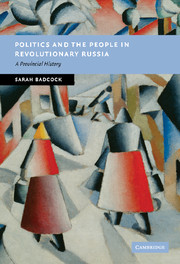Book contents
- Frontmatter
- Contents
- List of figures and table
- Notes on the text
- Acknowledgements
- Maps
- 1 Introduction
- 2 The February revolution: whose story to believe?
- 3 The Socialist Revolutionary Party and the place of party politics
- 4 Choosing local leaders
- 5 Talking to the people and shaping revolution
- 6 Soldiers and their wives
- 7 ‘Water is yours, light is yours, the land is yours, the wood is yours’
- 8 Feeding Russia
- Conclusions
- Bibliography
- Index
- NEW STUDIES IN EUROPEAN HISTORY
5 - Talking to the people and shaping revolution
Published online by Cambridge University Press: 10 August 2009
- Frontmatter
- Contents
- List of figures and table
- Notes on the text
- Acknowledgements
- Maps
- 1 Introduction
- 2 The February revolution: whose story to believe?
- 3 The Socialist Revolutionary Party and the place of party politics
- 4 Choosing local leaders
- 5 Talking to the people and shaping revolution
- 6 Soldiers and their wives
- 7 ‘Water is yours, light is yours, the land is yours, the wood is yours’
- 8 Feeding Russia
- Conclusions
- Bibliography
- Index
- NEW STUDIES IN EUROPEAN HISTORY
Summary
Comrades! Public teachers! You gave the people literacy, now you must give them development! Make free Russia's conscious citizens out of yesterday's village philistines!
(From educational pamphlet, 1917)This chapter looks at the methods used by the political elite to communicate with ordinary people and offers some explanations for the problems that they faced. Russia's political elite sought to educate ordinary people, and to transform their cultural lives, in the pre-revolutionary period. These attempts to communicate with and to educate ordinary people were intensified in 1917. So-called ‘cultural-enlightenment campaigns’ were high on the agenda of public life in the course of 1917. Correspondingly, ordinary people sought out and utilised information on the nature of the revolution, and of how they were to participate in the revolution. The Provisional Government and soviets, and educated society in general, sought to orchestrate popular education. For the Provisional Government, popular education had to be a success, as they relied on popular understanding and participation in the administration. Without popular support, their stated goals of overseeing democratic elections, keeping Russia in the war and preventing civic disorder were unachievable.
Educational campaigns were undertaken with heartfelt faith from Russia's political elite that education could ‘transform’ Russia's citizens into newly fledged democratic citizens, who could participate in the building of an egalitarian, even utopian, state.
- Type
- Chapter
- Information
- Politics and the People in Revolutionary RussiaA Provincial History, pp. 123 - 144Publisher: Cambridge University PressPrint publication year: 2007

